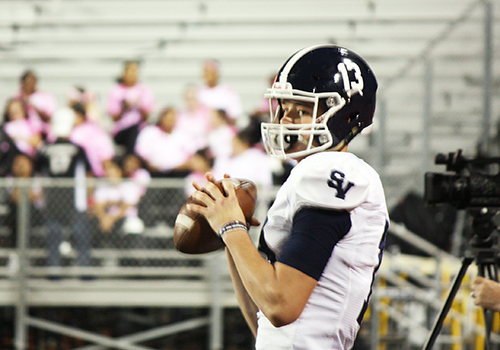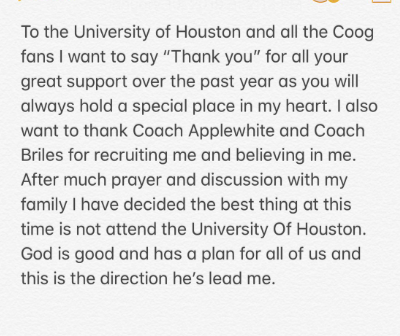Changing directions
Former quarterback decommits from University of Houston

Senior quarterback verbally committed to the University of Houston in his junior year. The recent firing of head coach Major Applewhite and the hiring of Dana Holgorson has Williams considering other options.
January 12, 2019
Former star quarterback Levi Williams decommitted from the University of Houston on the heels of former Cougar head coach Major Applewhite being fired in lieu of former West Virginia coach Dana Holgorsen, according to his Instagram page Thursday night.
Williams had been committed to Houston since his junior season, and had even signed his National Letter of Intent to play for the Cougars, so the decision came as a big surprise.

It was “coaching and community” that attracted Williams to Houston, which all changed when Applewhite was fired. Applewhite was “like family to [Williams], so it felt like an emotional loss.” Williams removed “Houston” from his bio, which now reads “QB @ The University of .” Always the hard worker, Williams referred to “community, coaches, and play style” as the biggest factors in his recruitment.
Houston released Williams from his NLI, so he is free to sign wherever he pleases. His preferred schemes are “pro-style or spread,” and he has received interest from at least four other Division I schools (Baylor, Oklahoma State, TCU and Texas State). While none have officially extended offers – likely because of his prolonged commitment to Houston – he said he would announce a decision “very soon,” perhaps insinuating it will come before National Signing Day on Feb. 6.
So, how would those four schools stack up, assuming no mystery schools show up?
According to 247 Sports, Baylor has the most stacked position, with three four-stars who will be underclassmen next year. Additionally, coach Matt Rhule already has taken interviews for NFL job openings, such as the New York Jets. Williams has shown he cares about consistency, and a coach who might bolt at the first offer might not be the best plan. However, they do run the spread system Williams so covets, so there’s always a chance.
Oklahoma State presents an intriguing opportunity, one in which culture, scheme and coaching stability check all the right boxes. Mike Gundy is an innovative playcaller who has sent big quarterbacks such as Mason Rudolph to the NFL, although it is unknown whether Williams would be willing to leave Texas. In addition, three underclassmen came into the program as three-stars, the same rating Williams himself holds. With two upperclassmen seemingly entrenched for the next few years, Williams would probably be fighting for a starting job his third season, which would likely be as a redshirt sophomore.
TCU is always an option. With former teammate and receiving weapon Trevon Moehrig-Woodard shoring up the secondary in Fort Worth, one could assume the pair would like to be teammates once again.
Gary Patterson is a coach with a penchant for dual-threat quarterbacks leading a spread offense (most recently Trevone Boykin), although he has also used players like Kenny Hill and Andy Dalton to command a more pro-style approach, albeit with a higher percentage of spread concepts than most pro-style schools.
Patterson has displayed time and again his willingness to spurn the NFL in favor of the college game, and it’s worked – the Horned Frogs were considered to be a legitimate playoff contender as recently as 2014 (they were left out, with eventual champions Ohio State making it in over Patterson’s squad).
However, with two four-star underclassmen for next year, playing time will be hard to come by.
If Williams simply wants the best chance to start, Texas State might be his best option, although he might not give them a second look.
Coach Everett Withers was fired, with Jake Spavital – known primarily for his work as Johnny Manziel’s offensive coordinator after Kliff Kingsbury left – taking over the reins. However, Spavital, like Rhule, is already getting looks from the NFL, including the offensive coordinator job with Kliff Kingsbury’s Arizona Cardinals.
Additionally, Spavital prefers more of an air-raid system, with spread concepts but less of a traditional system, with a shotgun-heavy system using lots of halfback draws and three-step drops. It isn’t completely unlike what Williams ran in high school, but it also isn’t a situation that feels right, especially with the long bowl drought and subpar conference, even as compared to a Group of 5 school like Houston.
As a junior, his first year as a starter, Williams could let it fly to receivers, such as Moehrig-Woodard, and shined, compiling 2,111 passing yards and a 25 touchdowns to only eight interceptions, with an additional 390 yards and four scores on the ground. Despite a down passing year as a senior (800 yards and six touchdowns with three picks on under 40 percent completion), Williams still managed nearly 1,500 all-purpose yards and 14 touchdowns despite his lack of protection, thanks to his athleticism and prowess as a runner.


